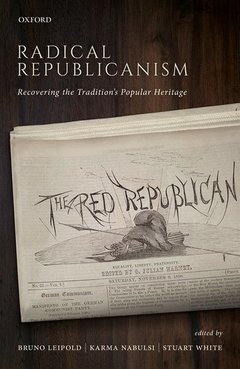Description
Radical Republicanism
Recovering the Tradition's Popular Heritage
Coordinators: Leipold Bruno, Nabulsi Karma, White Stuart
Language: English
Subject for Radical Republicanism:
Publication date: 03-2020
288 p. · 1.5x2.4 cm · Hardback
288 p. · 1.5x2.4 cm · Hardback
Description
/li>Biography
/li>
Republicanism is a powerful resource for emancipatory struggles against domination. Its commitment to popular sovereignty subverts justifications of authority, locating power in the hands of the citizenry who hold the capacity to create, transform, and maintain their political institutions. Republicanism's conception of freedom rejects social, political, and economic structures subordinating citizens to any uncontrolled power - from capitalism and wage-labour to patriarchy and imperialism. It views any such domination as inimical to republican freedom. Moreover, it combines a revolutionary commitment to overturning despotic and tyrannical regimes with the creation of political and economic institutions that realise the sovereignty of all citizens, institutions that are resilient to threats of oligarchical control. This volume is dedicated to retrieving and developing this radical potential, challenging the more conventional moderate conceptions of republicanism. It brings together scholars at the forefront of tracing this radical heritage of the republican tradition, and developing arguments, texts, and practices into a critical and emancipatory body of political and social thought. The volume spans historical discussions of the English Levellers, French and Ottoman revolutionaries, and American abolitionists and trade unionists; explorations of the radical republican aspects of the thought of Machiavelli, Marx, and Rousseau; and theoretical examinations of social domination and popular constitutionalism. It will appeal to political theorists, historians of political thought, and political activists interested in how republicanism provides a robust and successful radical transformation to existing social and political orders.
Bruno Leipold is a Fellow in Political Theory at the London School of Economics and Political Science. He completed his DPhil at the University of Oxford and has held postdoctoral positions at the European University Institute and the Justitia Amplificata Centre for Advanced Studies at the Goethe University of Frankfurt and the Free University of Berlin. Karma Nabulsi is Fellow and Tutor in Politics at St Edmund Hall, University of Oxford. She writes and lectures on 18th and 19th century republicanism, revolutions, and democracy, as well as on Palestine, especially Palestinian refugees. Stuart White is Fellow in Politics at Jesus College, Oxford, having formerly taught in the Department of Political Science, M.I.T. His research is focused on democracy, republican values, and the economy, with related interests in both social policy and the political process. He is the author of The Civic Minimum (2003). He blogs occasionally at openDemocracy.
© 2024 LAVOISIER S.A.S.




